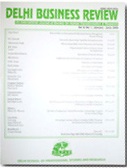|
Publication Ethics Policy & Malpractice Statement
Delhi Business Review is a bi-annual international journal that publishes double blind peer reviewed high quality research papers in all areas related to business, commerce, economics, and management. The act of publishing research paper involves many parties, each of which plays an important role in the development of a coherent network of knowledge. It is, therefore, essential that all authors, reviewers, editorial team, and Editor-in-Chief in the process of publishing the journal, conduct themselves in accordance with the highest level of professional ethics and standards. The Delhi Business Review editorial team is committed to meet and uphold standards of ethical behavior at all stages of the publication process.
Delhi Business Review is dedicated to publish high quality work and adheres to the preeminent principles of ethics of academic publishing. The manuscripts published in the journal are freely available to readers spread across all parts of the world.
The case(s) of ethical breaches during the publication process monitored strictly by the Editor-in-Chief of the journal. In order to handle the manuscript(s) which are found to violate the ethical publishing guidelines of the journal, policies have been framed with peculiarity and diligence. Upon detection of an instance of ethical violation, an investigation is carried out to examine the facts the best course of action is decided taking into consideration the ethical guidelines for standard academic publishing.
The key expectations from Editorial Board are summarized below:
The responsibilities of Editor-in-Chief and the members of Editorial Board are as follows:
- Acknowledgement: The receipt of manuscripts should be acknowledged by the Office of the Editor-in-Chief within three working days from the date of submission.
- Confidentiality of work: It should be ensured by the Editor-in-Chief that the method of processing of manuscripts submitted by the author(s) is confidential. Also, in no case the content of the manuscripts should be disclosed to any outsider.
- Objectivity and fairness: The Editor-in-Chief possess the right to decide whether to accept or reject a manuscript after taking into consideration the significance, originality, and clarity of the manuscript and its relevance to the journal without discrimination on grounds of gender, religious beliefs, political affiliation, ethnic or geographical origin, caste or creed, etc., of the authors.
- Conviction: The Editor-in-Chief is responsible for taking prompt action and responding expeditiously when an ethical complaint occurs in relation to a submitted manuscript or a published paper. The Editor-in-Chief should provide reasonable opportunity to the author to respond to such complaint. With reference to the same, a formal retraction or correction in writing may also be required.
Procedure for dealing with unethical behavior
In handling complaints and disputable situations the Editor-in-Chief will follow the guidelines mentioned below:
- Identification of unethical behavior: At any given point during the publication of research paper in the journal if any of the members of the editorial team finds any suspected unethical behavior or misconduct, he or she should immediately inform the same to the Editor-in-Chief. Misconduct and unethical behavior may include the examples discussed above or any other act which is deemed to be unethical leading to the breach of trust between parties involved in the publication process.
- Investigation of unethical behavior: The Editor-in-Chief would initiate the investigation once a written report of unethical behavior is submitted to him. During the investigation, any evidence should be treated as strictly confidential and only made available to those in the investigation committee. Before any judgment is passed, the author should be given the opportunity to respond to any allegations. At the end of the investigation, if it is concluded that misconduct has occurred, then it will be classified as either a minor or serious offense.
- Action to be taken: Minor misconduct might be dealt with or without the need to consult third parties.
In case of major misconduct, the course of action to be taken is decided by Editor-in-Chief in the light of evidence available after consultation with the Editorial Board of DBR and external group of experts.
Depending upon the severity of the act of misconduct or unethical behavior, the following actions (separately or in conjunction) are taken:
- Issuance of a formal letter in order to inform and sensitize the author or reviewer about the act conducted by them leading to breach of ethical standards of the journal.
- Issuance of a strongly-worded letter to the party at default outlining the misconduct and that should serve as a strict warning.
- Publication of a formal notice describing the misconduct.
- Publication of an Editorial detailing the misconduct so as to inform the readers about the same.
- Formal retraction of a publication from the journal, in conjunction with informing the head of the author or reviewer’s department, Abstracting & Indexing services and the readership of the publication.
- A ban on submissions from the concerned individual for a defined period.
- Escalating the case to a professional organization or legal authority for further action.
|
|

